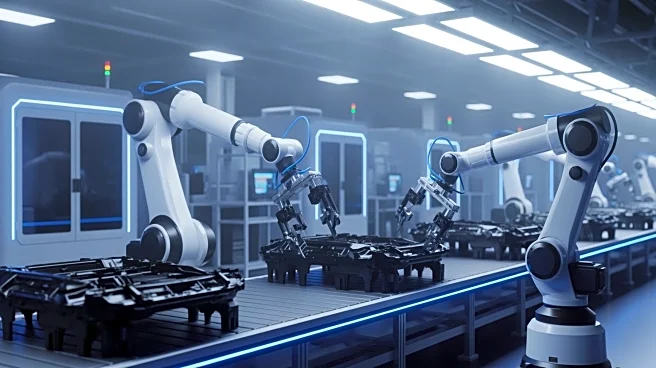What's Happening?
Tesla CEO Elon Musk announced plans to ramp up production as fast as possible, despite higher costs impacting the company's third-quarter margins. Tesla reported a net profit of $1.37 billion on $28.1
billion in revenue, delivering over 497,000 vehicles, a 7% increase from the previous year. The expiration of a $7,500 tax credit contributed to increased consumer purchases before the deadline. However, operating expenses rose by 50%, affecting profitability. Musk expressed confidence in Tesla's self-driving technology, indicating plans to expand production capacity and increase capital spending in 2026. The company aims to grow its automotive and AI initiatives, including the Optimus robot.
Why It's Important?
Tesla's decision to expand production rapidly reflects its commitment to maintaining leadership in the electric vehicle market. The move comes at a time when the expiration of tax credits has left the EV market uncertain. By focusing on self-driving technology and AI, Tesla aims to differentiate itself from competitors and capitalize on emerging opportunities. However, the increased capital spending and production expansion may lead to higher costs, impacting profitability. Investors are closely monitoring Tesla's ability to balance growth with financial stability, as the company's market capitalization continues to rise.
What's Next?
Tesla plans to increase production capacity at its factories in California, Texas, Berlin, and Shanghai, with a focus on the Cybercab model. The company aims to produce over 2.2 million vehicles annually, with additional capacity for 125,000 cybercabs. Musk's confidence in unsupervised full self-driving technology suggests potential advancements in autonomous vehicle capabilities. As Tesla ramps up production, stakeholders will be watching for updates on profitability and market share. The company's strategic decisions, including the proposed $1 trillion pay plan for Musk, will be key factors in shaping its future direction.
Beyond the Headlines
Tesla's expansion plans highlight the growing importance of AI and autonomous technology in the automotive industry. The company's focus on self-driving cars and robots reflects broader trends towards automation and innovation. As Tesla invests in AI initiatives, ethical considerations such as data privacy and job displacement may arise. The cultural impact of widespread autonomous technology could reshape transportation norms and influence consumer behavior. Tesla's ability to navigate these challenges while maintaining growth will be crucial for its long-term success.










